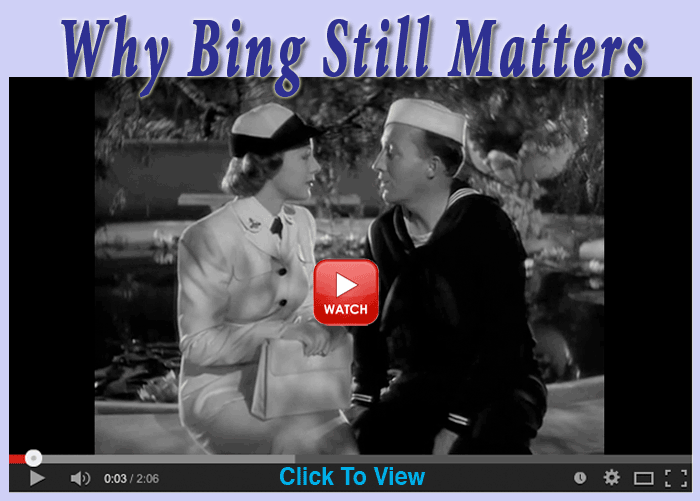Why Bing Still Matters

Thirty-seven years ago yesterday, Bing Crosby holed out for an 85 on
a golf course near Madrid, Spain. After he and his partner collected their
$10 winnings, on his walk to the clubhouse, a massive heart attack suddenly
silenced the Voice That Invented American Popular Music.
That capitalized accolade is not only the opinion of
an admittedly fervent fan—it’s a feeling shared by every competent
musical and cultural historian. Before Bing first recorded in 1926, male
singers were either opera belters or epicene high tenors. Afterward, as
one of his most accomplished imitators, Perry Como, said: “You either
sang like Bing, or you didn’t eat.”
By any measure, Bing was the most influential and successful
performer of the 20th century. He placed 396 records in the Top 30 charts—Frank
Sinatra had 209, Elvis 149 and The Beatles 68. Bing had 42 number one
hits—The Beatles had 24, Elvis 18, and Sinatra only 7. His White
Christmas is the best-selling record of all time; it made the pop charts
20 separate times and has sold over 100 million copies worldwide. In the
movies, Bing was the number one box office star for five consecutive years
from 1944-1948, made the top ten 15 times between 1934-1954, and won the
Oscar for Best Actor in 1944.
Staggering statistics aside, the consistent quality
(both definitions of the noun apply) in over 50 years of studio recordings
and live, radio, and movie performances is Bing's honeyed baritone—casual
yet confident, conversational yet conveying the most profound sentiments.
A cursory listen to today’s most popular songs (a brief survey is
all I can stomach) reveals the virtues of class, taste, and subtle craft
have somehow gone missing.
Fortunately, we can still revel in these elements by
viewing a “best of” list compiled by both myself and fellow
devotee, Geoffrey.
Michael Kelly
Michael is Cargo Communications Manager at United Cargo. |





